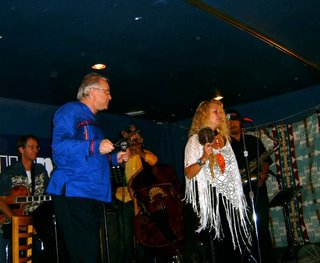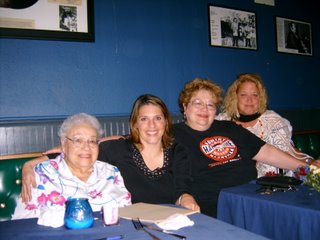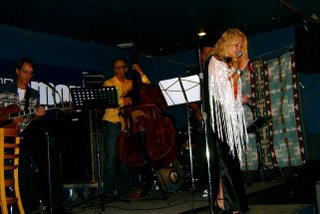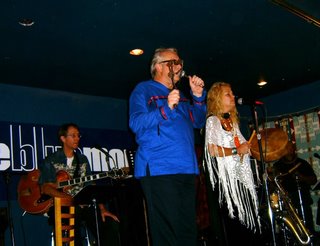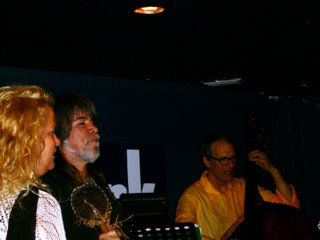
Monday, October 30, 2006
Saturday, October 07, 2006
Lynn Darroch (Oregonian A & E) on Jim Pepper
Sound Check
Friday, September 22, 2006, Oregonian Arts & Entertainment
By LYNN DARROCH
A STRONG SPIRIT -- "I was very much alone in my life," Sean Cruz says, "but in this house, I've never felt alone."
Cruz, the promoter of Saturday's concert by the Jim Pepper Remembrance Band, bought the former Pepper family home in Parkrose four years ago.
You could say the spirit of the late musician saved him.
A saxophonist, singer and composer of Kaw and Creek descent, Pepper fused Native American music and jazz with a powerful, edgy style. One of the most colorful musicians to come out of Portland, he played with legends including Ornette Coleman and younger stars such as John Scofield. His work also was performed by the Brooklyn Philharmonic and Cologne Symphony orchestras.
Though Pepper died in 1992 from lymphoma at age 50, he continues to disturb and inspire, an outcome he prayed for in "Remembrance": "You must not forget me when I'm long gone," he chanted, "because I loved you so dearly."
"I have to credit his music with helping me get through the last four years," says Cruz, whose children were abducted in 1996 in a case that resulted in the Oregon Legislature's SB 1041, called "Aaron's Law" after his son. "His music just uplifts me."
Saturday's shows are designed to initiate a Jim Pepper Music Festival in Portland. The band will include Portland-based artists who worked with Pepper, as well as saxophonist Renato Caranto, who will take Pepper's part in the ensemble.
Pepper was one of the first to develop jazz-rock fusion, but many of his songs drew from his heritage, including "Witchi Tai To," with its mounting chord progression and hypnotically repeating phrases. Based on a chant from the peyote religion of his grandfather, it reached the Top 40 on pop charts in 1971.
His music surged between those evocative chants and hard-edged free improvisation -- often as raucous and difficult as the man himself. At best, it struck with the obsidian flash of a claw and soared with the majesty of his Native American name, Flying Eagle.
"The music is a healing force," Pepper says in the award-winning documentary film "Pepper's Pow Wow."
"When it was good, people felt like they had been through a spiritual experience," says pianist and composer Gordon Lee, who worked with the saxophonist for 14 years. "Funny thing was, he wasn't a very spiritual guy. Jim was an earthy guy."
And angry, too. At times his performances were more raw wound than healing experience. The war dance "Custer Gets It," for instance, which will be interpreted by dancer Luciana Proano, includes a violent, free-form section that expresses another side of the Native American experience.
"He wrote what he thought of as Indian songs like 'Comin' and Goin',' " says Lee, "and he had jazz songs. Jim bridged the gap, and you would get both in any performance."
________
Lynn Darroch is a Portland freelance writer.
Friday, September 22, 2006, Oregonian Arts & Entertainment
By LYNN DARROCH
A STRONG SPIRIT -- "I was very much alone in my life," Sean Cruz says, "but in this house, I've never felt alone."
Cruz, the promoter of Saturday's concert by the Jim Pepper Remembrance Band, bought the former Pepper family home in Parkrose four years ago.
You could say the spirit of the late musician saved him.
A saxophonist, singer and composer of Kaw and Creek descent, Pepper fused Native American music and jazz with a powerful, edgy style. One of the most colorful musicians to come out of Portland, he played with legends including Ornette Coleman and younger stars such as John Scofield. His work also was performed by the Brooklyn Philharmonic and Cologne Symphony orchestras.
Though Pepper died in 1992 from lymphoma at age 50, he continues to disturb and inspire, an outcome he prayed for in "Remembrance": "You must not forget me when I'm long gone," he chanted, "because I loved you so dearly."
"I have to credit his music with helping me get through the last four years," says Cruz, whose children were abducted in 1996 in a case that resulted in the Oregon Legislature's SB 1041, called "Aaron's Law" after his son. "His music just uplifts me."
Saturday's shows are designed to initiate a Jim Pepper Music Festival in Portland. The band will include Portland-based artists who worked with Pepper, as well as saxophonist Renato Caranto, who will take Pepper's part in the ensemble.
Pepper was one of the first to develop jazz-rock fusion, but many of his songs drew from his heritage, including "Witchi Tai To," with its mounting chord progression and hypnotically repeating phrases. Based on a chant from the peyote religion of his grandfather, it reached the Top 40 on pop charts in 1971.
His music surged between those evocative chants and hard-edged free improvisation -- often as raucous and difficult as the man himself. At best, it struck with the obsidian flash of a claw and soared with the majesty of his Native American name, Flying Eagle.
"The music is a healing force," Pepper says in the award-winning documentary film "Pepper's Pow Wow."
"When it was good, people felt like they had been through a spiritual experience," says pianist and composer Gordon Lee, who worked with the saxophonist for 14 years. "Funny thing was, he wasn't a very spiritual guy. Jim was an earthy guy."
And angry, too. At times his performances were more raw wound than healing experience. The war dance "Custer Gets It," for instance, which will be interpreted by dancer Luciana Proano, includes a violent, free-form section that expresses another side of the Native American experience.
"He wrote what he thought of as Indian songs like 'Comin' and Goin',' " says Lee, "and he had jazz songs. Jim bridged the gap, and you would get both in any performance."
________
Lynn Darroch is a Portland freelance writer.
Remembrance Band media advisory
Sean Cruz Presents:
The Jim Pepper Remembrance Band, an all-star lineup of former collaborators of the legendary Native American innovator, takes the stage for two shows at the Blue Monk on Saturday, September 23.
Jim Pepper, whose Indian name was “Flying Eagle,” was a self-taught master of the saxophone who became one of the most important musicians and composers in the history of American music, creating a unique synthesis of Native American music with the language of modern jazz.
Working with Larry Coryell and the Free Spirits in the 1960s, he was among the first to develop jazz-rock fusion. A member of the Indian Hall of Fame and the Native American Music Awards Hall of Fame, and recipient of the Lifetime Music Achievement Award by the First Americans in the Arts, his music was always informed by his Creek/Kaw heritage.
The Remembrance Band:
Gordon Lee, piano, musical director
Caren Knight-Pepper, vocals, percussion
Glen Moore, bass
JB Butler, guitar
Renato Caranto, saxophone
Carlton Jackson, drums
Luciana Proańo, dance, performs “Custer Gets It” medley
This concert is the official planning kickoff for the first annual Jim Pepper Music Festival.
The Jim Pepper Remembrance Band, an all-star lineup of former collaborators of the legendary Native American innovator, takes the stage for two shows at the Blue Monk on Saturday, September 23.
Jim Pepper, whose Indian name was “Flying Eagle,” was a self-taught master of the saxophone who became one of the most important musicians and composers in the history of American music, creating a unique synthesis of Native American music with the language of modern jazz.
Working with Larry Coryell and the Free Spirits in the 1960s, he was among the first to develop jazz-rock fusion. A member of the Indian Hall of Fame and the Native American Music Awards Hall of Fame, and recipient of the Lifetime Music Achievement Award by the First Americans in the Arts, his music was always informed by his Creek/Kaw heritage.
The Remembrance Band:
Gordon Lee, piano, musical director
Caren Knight-Pepper, vocals, percussion
Glen Moore, bass
JB Butler, guitar
Renato Caranto, saxophone
Carlton Jackson, drums
Luciana Proańo, dance, performs “Custer Gets It” medley
This concert is the official planning kickoff for the first annual Jim Pepper Music Festival.
Sunday, October 01, 2006
Oregon Senate Joint Resolution 31, honoring Jim Pepper
2005 Senate Joint Resolution 31 (SJR31)
Sponsored by Senator Avel Louise Gordly
(at the request of Suzie Pepper Henry):
Whereas the 2005 Portland Jazz Festival paid tribute to the musical legacy of Jim Pepper, a true son of Oregon, with a concert dedicated to the late Native American saxophonist and jazz legend; and
Whereas workshops, panel discussions, performers and audiences at the festival recalled how Jim Pepper, born to Gilbert and Floy Pepper in Salem on June 18, 1941, blazed a unique trail across the musical horizon with his innovative synthesis of Native American song, the harmonic structures of modern jazz and the rhythms of Africa, South America and the Caribbean; and
Whereas Jim Pepper performed throughout the United States, Europe and Africa, played with such jazz giants as Ornette Coleman, Don Cherry, Colin Wolcott, Larry Coryell and Mal Waldron; and
Whereas Jim Pepper also collaborated with many Oregon musicians, including Gordon Lee, Tom Grant, Leroy Vinnegar, Nancy King, Caren Knight-Pepper, Obo Addy, David Friesen, Dan Balmer, Glenn Moore, Ron Steen, Sonny King, Dennis Springer, Mel Brown, Nick Gefroh, Marianne Mayfield, Ralph Black, Lee Reinoehl, Carlton Jackson and many others; and
Whereas Jim Pepper's 1971 crossover hit 'Witchi Tai To, ' based on a Native American Church peyote chant taught to him by his grandfather, earned him a spot on both the jazz and Top 40 radio charts and continues to be widely popular among national and international performers and recording artists to this day; and
Whereas Jim Pepper's remarkable career was marked by more than 50 recordings as bandleader, featured artist and composer, including 'Pepper's Pow Wow,' 'Comin' and Goin'' and ' Remembrance'; and
Whereas Jim Pepper's symphony 'Four Winds' was performed by the Brooklyn Philharmonic Orchestra in New York and by the Cologne Symphony Orchestra in Germany; and
Whereas Jim Pepper served as musical director for 'Night of the First Americans,' a Native American self-awareness benefit concert at the John F. Kennedy Center for the Performing Arts in Washington, D.C. in 1980; and
Whereas Jim Pepper toured Africa with Don Cherry as part of a United States-Africa cultural exchange program; and
Whereas Jim Pepper succumbed to lymphoid cancer in February 1992 in Portland, Oregon, at age 50; and
Whereas Jim Pepper was honored posthumously in 1999 with the Lifetime Musical Achievement Award by the First Americans in the Arts and was inducted into the Indian Hall of Fame in 1998 and the Native American Music Awards Hall of Fame in 2000; and
Whereas 'Pepper's Pow Wow,' the 1996 award-winning documentary of his life produced and directed by Sandra Osawa and Yasu Osawa, premiered at the Sundance Film Festival, was broadcast on PBS in 1997 and 1999 and has since been presented to enthusiastic audiences at the Amiens Film Festival, the Margaret Mead Film Festival, the Native American Film and Video Festival, the Red Earth Film and Video Festival and the Portland Jazz Festival; and
Whereas the Leroy Vinnegar Jazz Institute and the Oregon Cultural Heritage Commission named Jim Pepper 'Jazz Artist of the Year' and presented the Bill McClendon Award for Excellence in Jazz to his mother at the 2005 Portland Jazz Festival; and
Whereas Jim Pepper's music continues to be performed and recorded in countries throughout the world, including Germany, where a performance of 'Witchi Tai To' by the WDR Radio Orchestra and the Remembrance Band, arranged and conducted by Gunther Schuller, was recorded; and
Whereas Jim Pepper's life and music harmonized distinct cultures and served as a poetic example for all indigenous people, ' walking in three worlds with one spirit'; and
Whereas Jim Pepper is survived by his mother, Floy Pepper, his sister, Suzanne Henry of Portland, his nephews, Jim Pepper Henry and Jesse Laird Henry, and his grandnephew, Jackson Laird Henry; and
Whereas Floy Pepper said during her acceptance of her son's First Americans in the Arts award in 1999, 'Jim Pepper was a member of the Kaw Indian Nation known as 'The Wind People' from his father. From me, his mother, he was a member of the Creek Indian Nation known as 'The People of the Waters.' It's no wonder his music was so strong and powerful--with the wind to carry his music to the four directions of the Earth. And as long as the grass shall grow and the waters flow--which is forever--may his spirit remain alive for time immemorial'; now, therefore,
Be It Resolved by the Legislative Assembly of the State of Oregon:
(1) The members of the Seventy-third Legislative Assembly honor the extraordinary accomplishments and musical legacy of Oregon native son Jim Pepper and direct that a copy of this resolution be delivered to the Oregon Historical Society for inclusion in its permanent collection.
(2) The members of the Seventy-third Legislative Assembly direct that a copy of this resolution be delivered to the National Museum of the American Indian, Smithsonian Institution, Washington, D.C., for inclusion in its permanent collection.
(3) The members of the Seventy-third Legislative Assembly direct that a copy of this resolution be delivered to the Leroy Vinnegar Jazz Institute at Portland State University for inclusion in its permanent collection and encourage the creation and endowment of a Jim Pepper (hUnga-che-eda 'Flying Eagle') Chair at the university to further the study of Native American music and its relationship to jazz.
Adopted by Senate May 19, 2005
Adopted by House June 7, 2005
Subscribe to:
Comments (Atom)
